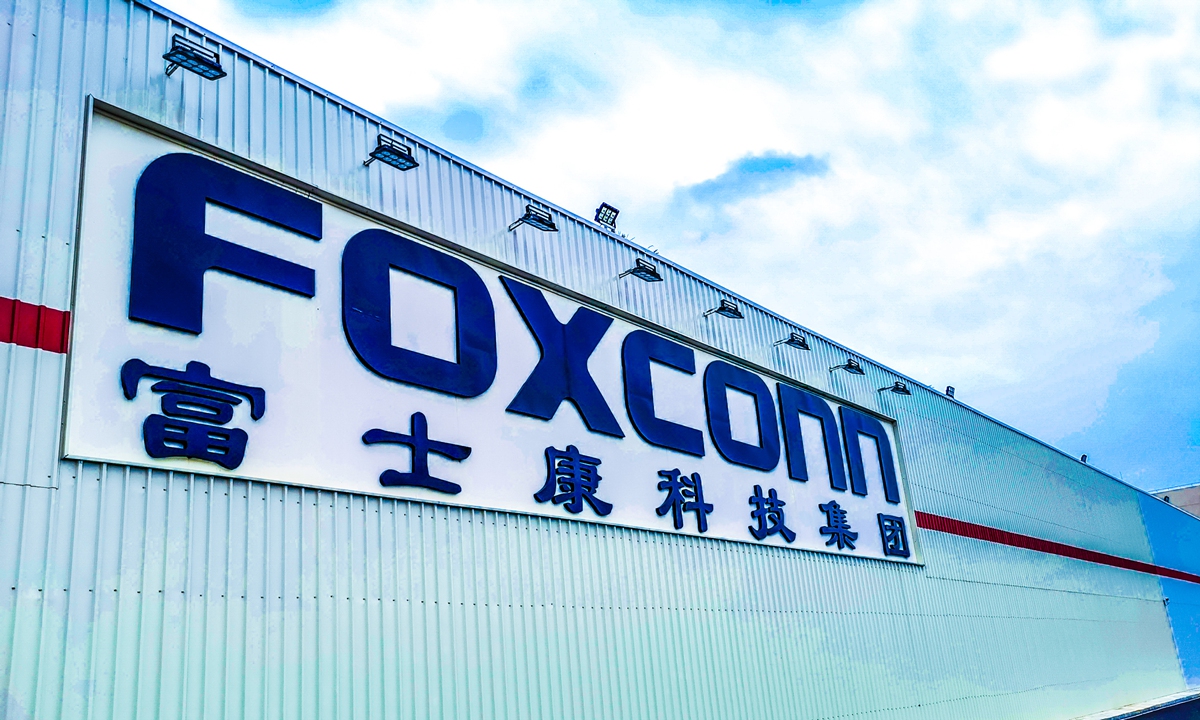
Foxconn Photo: VCG
Local authorities in Zhengzhou, Central China's Henan Province on Monday asked Foxconn to fulfill responsibility in anti-epidemic efforts and resume production and life in an orderly manner, as the epidemic situation at the plant drew nationwide attention.
The plant, which accounts for about 50 percent of iPhone's global shipments, faced serious difficulties due to the COVID-19 outbreak, as many workers reportedly left the facility and walked home, sparking widespread discussion online.
A notice posted on the official WeChat account of the Zhengzhou municipal government on Monday said that local authorities have asked Foxconn to fulfill responsibility in the anti-epidemic efforts and "restore the order or production and life in an orderly manner."
Hon Hai Technology Group (Foxconn) said in a statement sent to the Global Times on Sunday that "Zhengzhou park operation, in coordination with the government's epidemic prevention, is gradually coming under control."
At present, under the guidance of the local government, the Group's Zhengzhou park is continuing to implement epidemic prevention measures, closed-loop management, point-to-point commuting, daily nucleic acid and antigen screening, and providing employees with complimentary three-meals-a-day, the statement said.
"The Group will also coordinate back-up production capacity with our other parks to reduce any potential impact," it added.
The company will launch mass hiring drives at several of its other plants in the Chinese mainland to offset any impact, the Global Times learned from two people close to the matter.
A recruitment manager at the Shenzhen plant said that a mass hiring drive would take place in early November. "About 10,000 workers are needed to fill the gap," the person said, and they might work at the Zhengzhou plant or elsewhere, depending on the epidemic situation.
A recruitment manager in Taiyuan, North China's Shanxi Province, where the company also has a plant, told the Global Times on Monday that a mass hiring drive is already in progress.
"We are mainly looking for local people to reduce the risks of COVID-19 epidemic," the manager said.
Amid the epidemic situation at the company's Zhengzhou plant, production of iPhones could slump by as much as 30 percent, Reuters reported on Monday, citing an unidentified person with direct knowledge of the matter.
"The site is a central artery in Apple's production of the iPhone, which means the production of the latest iPhone 14 series could be affected," a veteran industry analyst who asked to remain anonymous told the Global Times.
But the analyst said that the impact could be limited if the situation can be controlled soon as local authorities have stepped in.
Ma Jihua, a veteran industry analyst, told the Global Times on Monday that "there is no way for the company to put all its eggs in one basket... the company may just transfer its production capacity to other factories in the Chinese mainland where the epidemic situation is less serious."
Weak demand for new iPhones also means less pressure for big shipments, he said.
Ming-Chi Kuo, a prominent Apple watcher, also said on Twitter over the weekend that "it's expected that Foxconn's production capacity will gradually improve within a few weeks, and there should be a limited impact on the iPhone shipments in the fourth quarter."
Experts said that with the measures the company has put in place with government coordination, the impact will be manageable.
Local authorities have also sent another 200 workers to the plant to conduct nucleic acid tests on workers inside the plant to stop the further spread of the virus, according to the official notice on Monday.
The local government has also urged Foxconn to improve workers' living and working conditions, including providing more pay and care for them.
Foxconn said in the statement on Sunday that for some employees who want to return home, the park is cooperating with the government to organize personnel and vehicles to provide a point-to-point orderly return service for employees from Sunday.




